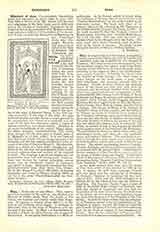

Ekkehard of Aura (URAUGIENSIS), Benedictine monk and chronicler, b. about 1050; d. after 1125. Very little is known of his life. About 1101 he went on a pilgrimage to the Holy Land, and in 1106 took part in the Council of Guastalla. Apparently he belonged at first to the monastery of St. Michael at Bamberg, and later (1108 or 1113) was abbot of the monastery of Aura, founded by Bishop Otto of Bamberg, on the Franconian Saale, near Kissingen, Bavaria; this monastery followed the Rule of Hirschau. The “Chronicon universale”, called after Ekkehard, is the chief source for the history of Germany during the years 1080-1125. In its present form it is divided into five books: the first contains ancient history from the Creation to the building of the city of Rome; the second extends to the birth of Christ; the third reaches the time of Charlemagne; the fourth goes to the opening of the reign of Emperor Henry V; the fifth contains an account of the reign of this ruler. No other medieval general chronicle covers so much ground; in the manuscripts now extant it is evidently not the work of one man but represents rather a fusion of various recensions and continuations. Bresslau, in his acute investigation of the subject (Neues Archiv für Ältere deutsche Geschichtskunde, VII), traces these changes, for the most part, to Frutolf, prior of St. Michael’s (d. February 17, 1103). It is now believed that Ekkehard simply rewrote the greater part of the chronicle, and that his original contribution is the account of the reign of Emperor Henry V. The chronicle, taken as a whole, is a very skillful compilation, and shows in the selection and arrangement of the matter a sound understanding and mastery of the material at hand. The language is good and simple, and the presentation clear and well summarized. Continuations were written by various chroniclers, among whom may be mentioned Conrad of Lichtenau and Albert of Stade. Ekkehard‘s chronicle has been published several times (Mon. Germ. Hist., Script., VI, 13-265; Migne, P.L., CLIV, 459-1060). A German translation was issued by Pflüger (Leipzig, 1893), as vol. LI of the series “Geschichtsschreiber der deutschen Vorzeit”.
PATRICIUS SCHLAGER

